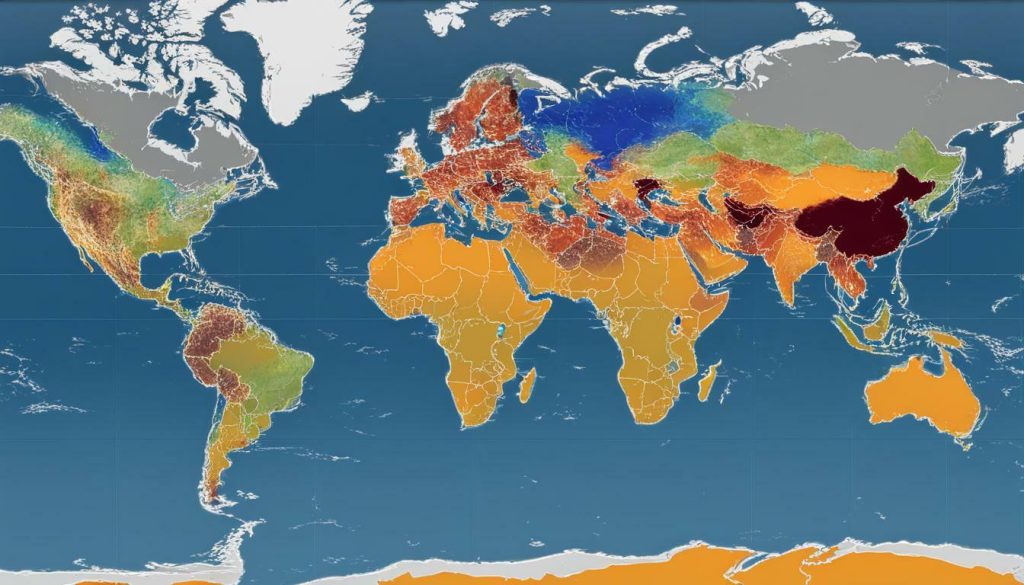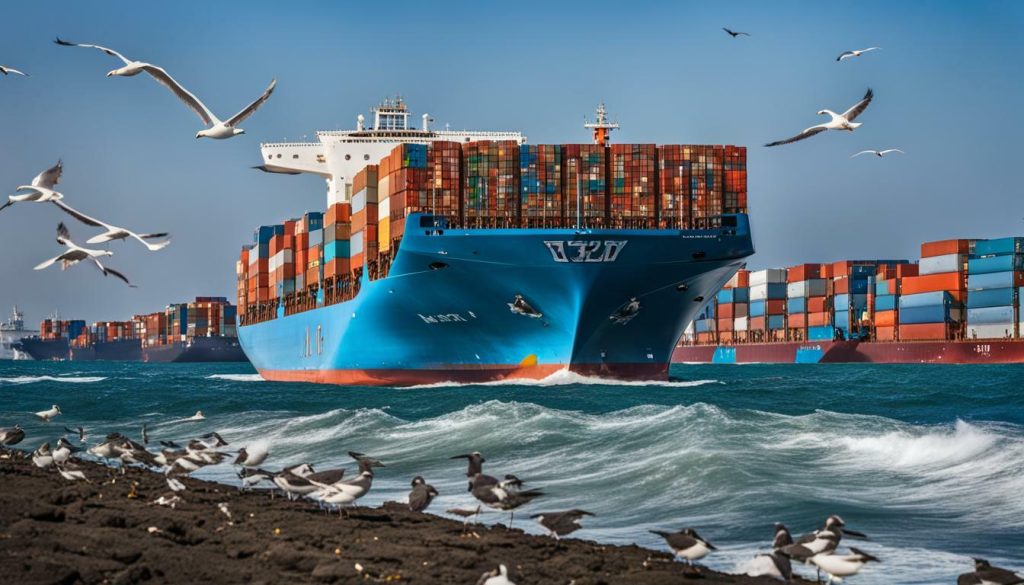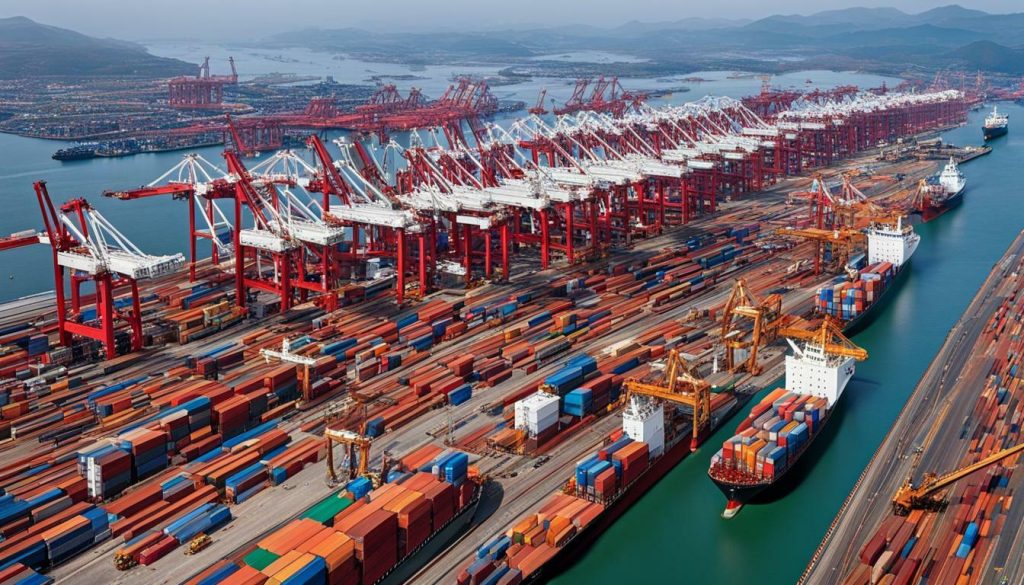Transporting containerized cargo can be a challenging and complex process, particularly when you consider the numerous factors that can impact the most efficient routes. From traffic congestion to road closures and inclement weather, there are many variables to consider when planning container shipping routes.
In this section, we will explore strategies and tactics to optimize your containerized cargo transport routes within the United States. By implementing effective planning and route optimization techniques, you can enhance productivity and efficiency in container shipping.
- Optimizing containerized cargo transport routes can improve productivity and efficiency.
- There are numerous factors that can impact the most efficient routes, such as traffic congestion and weather conditions.
- Effective planning and route optimization techniques can help streamline your supply chain and reduce costs.
- Understanding containerized cargo transport routes and identifying the most efficient paths can help you make informed decisions.
- Leveraging intermodal transport routes and utilizing advanced technologies for route planning are actionable strategies to consider.
Understanding Containerized Cargo Transport Routes
Containerized cargo transport routes are essential for global trade. They enable the transportation of goods and merchandise efficiently and quickly around the world. In this section, we will provide insights into the different shipping routes available for containerized cargo, including global container shipping routes and international shipping routes. Understanding these routes will help you identify the most efficient paths for your cargo.
Shipping routes for containerized cargo are pre-determined paths that container ships travel to transport cargo between ports. Global container shipping routes connect major ports around the world, while international shipping routes connect smaller ports and serve mostly regional trade.
The global container shipping routes connect the largest ports in the world, including those in Europe, Asia, North America, and South America. The routes also connect other major ports in Africa, Australia, and the Middle East. The global container shipping routes are divided into two major categories:
- East-West routes (connecting Asia to Europe and North America)
- North-South routes (connecting North America and Europe to South America, Africa, and Oceania)
International shipping routes, on the other hand, connect smaller, regional ports, and are designed to support regional trade and smaller-scale shipping operations. These routes are often operated by smaller ships, which can navigate shallow waterways and docks.
By understanding global and international container shipping routes, you can identify the most efficient and cost-effective paths for your containerized cargo transport. This knowledge can help you avoid delays and save costs in your supply chain operations.

In order to optimize your containerized cargo transport routes, it is essential to consider the various factors that can affect the efficiency and effectiveness of your shipping process.
One of the key considerations is container transport routes. These routes are dedicated to the transportation of containerized cargo and are designed to provide safe and efficient passage for these types of shipments. When selecting container routes, it is important to consider factors such as the distance, transit time, and cost.
Another factor to consider is the shipping lanes for containerized cargo. These are the routes that ships follow to transport cargo through the ocean. Depending on the route, shipping lanes can have different levels of congestion, which can impact transit time and cost. Understanding the most efficient shipping lanes for your cargo can help you optimize your containerized cargo transport routes.

Finally, it is essential to consider the specific routes available for containerized cargo. These routes can vary based on factors such as the origin and destination of the shipment, as well as the modes of transportation used throughout the journey. By understanding the available container routes, you can identify the most efficient options available for your specific shipment.
Strategies for Optimizing Containerized Cargo Transport Routes
Optimizing your containerized cargo transport routes is key to running a more efficient supply chain. Here are some strategies to consider:
Leverage Intermodal Transport Routes
Intermodal transport involves utilizing different modes of transportation, such as trucks, trains, and ships, to move cargo. By incorporating intermodal transport routes into your shipping strategy, you can minimize costs and improve efficiency. For example, using rail transport for long distances and trucks for short hauls can save time and money.
Another benefit of intermodal transport is that it can help mitigate risks, such as delays caused by traffic congestion or adverse weather conditions. By diversifying your shipping routes and modes of transportation, you can avoid potential bottlenecks and ensure timely delivery of your cargo.
Use Advanced Technologies for Route Planning
Route planning software can help you optimize containerized cargo transport routes and increase productivity. By analyzing data on shipping lanes, traffic patterns, and weather conditions, these tools can identify the most efficient and cost-effective routes for your cargo.
Additionally, real-time tracking systems can provide you with up-to-date information on the location and status of your cargo. This can help you anticipate and address potential issues, such as delays or damage to your cargo, before they become major problems.
Consider Shipping Consolidation
Shipping consolidation involves combining multiple shipments from different suppliers into a single container. By consolidating your shipments, you can reduce transportation costs and improve efficiency. This strategy can also help minimize the environmental impact of your shipping operations.
However, shipping consolidation requires careful planning and coordination with your suppliers. You will need to ensure that your suppliers are able to deliver their goods on time and that the cargo is compatible and can be safely transported together.

Optimizing your containerized cargo transport routes requires careful planning, but it can lead to significant cost savings and efficiency gains. By leveraging intermodal transport routes, using advanced technologies for route planning, and considering shipping consolidation, you can streamline your supply chain operations and improve your bottom line.
Conclusion
In conclusion, optimizing your containerized cargo transport routes can significantly improve your supply chain operations’ efficiency and productivity. By understanding the different container shipping routes available, including global and international routes, and considering key factors like shipping lanes and container transport routes, you can make informed decisions to streamline your container shipping processes.
Implementing strategies like leveraging intermodal transport routes and utilizing advanced route planning technologies can help you further optimize your cargo transport routes and reduce costs. With these tactics in place, you can achieve greater efficiency and profitability in your containerized cargo transport.
Remember, regularly reviewing and optimizing your containerized cargo transport routes is essential to maintaining a competitive edge in the global market. By continuously improving your shipping processes, you can keep your supply chain operations running smoothly and provide better service to your customers.
Thank you for reading! We hope this article has provided you with valuable insights and actionable strategies to optimize your containerized cargo transport routes.
FAQ
How can I optimize my containerized cargo transport routes?
To optimize your containerized cargo transport routes, you can implement effective planning and route optimization techniques. This includes utilizing advanced technologies for route planning, considering intermodal transport routes, and taking into account key factors such as container transport routes and shipping lanes dedicated to containerized cargo. By doing so, you can enhance productivity and efficiency in container shipping.
What are containerized cargo transport routes?
Containerized cargo transport routes refer to the paths or routes taken by containers when being transported from one location to another. These routes can include global container shipping routes for international shipments or specific container routes within a country or region. Understanding these routes is essential for optimizing your containerized cargo transport and ensuring efficient supply chain operations.
What factors can affect containerized cargo transport routes?
Several factors can impact containerized cargo transport routes, including container transport routes, shipping lanes dedicated to containerized cargo, and other logistical considerations. It is important to consider factors such as port access, transit times, infrastructure capacity, and regulations specific to container shipping when planning and optimizing your cargo transport routes.
What strategies can I use to optimize containerized cargo transport routes?
There are various strategies you can employ to optimize containerized cargo transport routes. Some of these include leveraging intermodal transport routes, which involve combining different modes of transportation such as trucks, trains, and ships. Additionally, utilizing advanced technologies for route planning and analysis can help optimize efficiency and reduce costs in container shipping. It is also important to continuously evaluate and adjust your routes based on factors such as customer demands and market changes.
Why is optimizing containerized cargo transport routes important?
Optimizing containerized cargo transport routes is crucial for improving productivity and streamlining supply chain operations. By optimizing routes, you can reduce transit times, minimize transportation costs, and ensure timely delivery of goods. This not only enhances customer satisfaction but also enables you to achieve greater efficiency and profitability in your containerized cargo transport.


